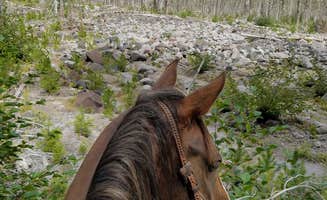Equestrian and tent campers alike find Hood River's camping options provide access to the region's diverse ecosystems spanning from lush forests to drier, sage-covered landscapes. Most campgrounds sit at elevations between 1,000-4,000 feet, creating variable temperatures that can drop significantly at night even during summer months. Water availability varies dramatically by season with some springs drying completely by late summer.
What to do
Hiking diverse landscapes: Access the Pacific Crest Trail directly from Panther Creek Campground where "There is a spur from the PCT directly into the campground for easy access. There is a beautiful view of Mt. Hood just a couple of miles up the trail." The PCT connection makes this location ideal for day hikers wanting mountain views without committing to backpacking.
Swimming holes: Cool off in natural waters at multiple locations. One camper at Beacon Rock State Park noted that "Beacon Rock is an incredible, tall hill in the Columbia River Gorge... The view at the top, however, is amazing." The Columbia River provides swimming opportunities, though currents can be strong in certain areas.
Fishing opportunities: Try your luck at several stocked lakes and streams in the region. At Battle Ground Lake, one visitor mentioned "Great fishing! Trout, bass, blue gill... swimming area. Store on sites. Nice hike around lake with plenty of spots to rest and fish." The volcanic lake offers good catch rates, especially after spring stocking.
What campers like
Natural features: Many campgrounds offer proximity to unique geological formations. At Clackamas Lake, campers enjoy the "Beautiful views of Columbia river!" The campground provides access to Timothy Lake where "motorized boats are not allowed and on a sunny day Mt Hood is reflected in the water."
Spacing between sites: Oxbow Regional Park offers "quiet campsite with the basic amenities," where "the outer loop sites are quiet, spacious and wooded. They are also very close to a trailhead to nice hikes and the beach." The 1,000-acre park creates a wilderness feel despite being close to Portland.
Water proximity: Many campers appreciate sites near water features. At Bonney Crossing, "The campsites are all well spaced out parallel to a nice clean looking river." Another visitor noted, "Hear and see the water from half the sites," making this a popular choice for those seeking white noise and water views.
What you should know
Seasonal challenges: Bug activity peaks in early summer at many sites. At Clackamas Lake Campground, "Mosquitoes were pretty bad in early June, as might be expected." Another camper advised, "Seriously, bring bug spray and put it on the minute you get there."
Accessibility variations: Some campgrounds require significant walking to reach sites. At Battle Ground Lake, campers should know "you have to park down below and walk to the site, the furthest ones being over a quarter mile away." This affects how much gear you can practically bring.
Noise considerations: Train noise affects some otherwise peaceful locations. At Beacon Rock's RV area, "the train runs directly behind the site multiple times an hour and is loud." Road noise can also be an issue at Oxbow where campers should "Try to get a site as close to the river as you can so you can avoid the highway noise at night."
Tips for camping with families
Kid-friendly activities: Several campgrounds offer dedicated recreation areas. Oxbow Regional Park has "recent upgrades to playgrounds are awesome for the kids and the new welcome center makes check in a breeze." This creates entertainment options beyond hiking and swimming.
Connectivity concerns: Limited cell service is common throughout the region. A camper at Tillicum Campground noted "There's no cell service in the campground, but 1-2 bars of AT&T 4G is available about 3 miles from camp." At Oxbow, campers report "No wifi and we had no phone reception. There are emergency phones installed throughout the park."
Safety precautions: Wildlife awareness is essential in certain areas. Some campgrounds like Panther Creek are in bear country where "you need to come prepared and make sure you are able to secure your items in a safe way" since dedicated bear boxes aren't available at all locations.
Tips from RVers
Site accessibility: Many forest campgrounds have limitations for larger rigs. At Riley Horse Campground, "the spots are large, far apart from the other sites," with one camper noting "the horse pens were huge and we used them to help hang our hammocks." This dual-purpose feature makes the equestrian campground suitable for non-horse campers too.
Road conditions: Access roads to some campgrounds require careful driving. At Cultus Creek Campground, "The drive from Carson to the campsite had quite a few large potholes, but once you get to the site, it's fantastic." Plan extra travel time when accessing more remote horse campgrounds near Hood River, Oregon.
Hookup availability: Limited full-hookup sites exist in the region. At Beacon Rock, the Woodward area offers "only a small number of [full hookup sites] so felt spacious and secluded." These sites tend to book quickly during peak season.


